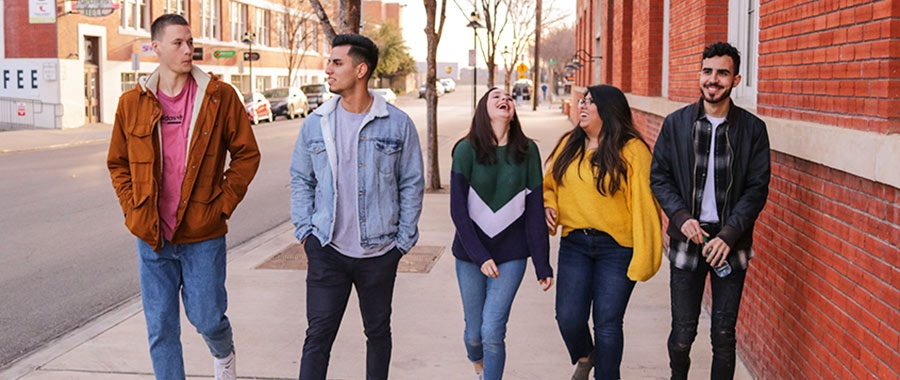The views expressed in our content reflect individual perspectives and do not represent the authoritative views of the Baha'i Faith.
Community service can be difficult. But often, the difficulty is in our attitude, not in our circumstances.
I’ve participated in community building efforts since I was very young, starting with the children’s class I taught in a neighborhood very close to mine. In this class, I gathered kids from many homes to talk about virtues like kindness, honesty and responsibility, do arts and crafts, sing songs and tell stories.
This activity was part of the Baha’i community building framework, which is based on a single principle: all humans, regardless of their race, religion, gender or background, have the same capacity to contribute to the betterment of the world. This framework honors the idea that sustainable change happens when diverse people work together at the grassroots—at the neighborhood level.
All men have been created to carry forward an ever-advancing civilization. – Baha’u’llah, Gleanings from the Writings of Baha’u’llah, p. 215.
Even at a very young age, I was very passionate about this class, and I did it for ten years, watching my students grow up alongside me. But in the beginning, there was a very irritating challenge that I kept running into.
During the first few years, I would wake up early, get a ride with my parents to pick the kids up, and discover that the parents had either not gotten the kids out of bed yet, or had sent them to a friend’s house. Sometimes, they didn’t even bother coming to the door.
These parents were very hardworking, friendly, and sincerely concerned with improving their children’s lives. They worked hard to overcome the negative forces around them, like alcoholism or domestic abuse. It wasn’t that they didn’t want their kids to come, but they didn’t see the class as an important force for positive change.
This was very frustrating to me at first, and took me a while to realize what the disconnect was. But then I looked at it from their point of view: here was this kid, who had a nice house and whose parents owned a car, coming in said car to play some games with their children. In their eyes, this was like a convenient hobby to me. It didn’t look sincere. It didn’t have a framework. It didn’t make them a priority.
We have a tendency to think, often on a subconscious level, that community service is all about us. It’s our way to repay our debt to society, or to feel good about ourselves. It’s a requirement to get into college, or to look more appealing for job opportunities. There are fundraisers everywhere. But how invested are we, really, with the issues we’re trying to address? How critical are we of the service we engage in?
Are these activities something we do once a year, once a month, once a week? Are they sustainable? Are we doing them because we think it’s a good idea… or because the entire community has thought about this together, and decided that it’s what’s best for all of us?
Justice demands universal participation. Thus, while social action may involve the provision of goods and services in some form, its primary concern must be to build capacity within a given population to participate in creating a better world. – Universal House of Justice, Ridván 2010.
It was difficult for me to face my own privilege and realize that I had to change my mindset. A big issue was that, in my heart, I still didn’t see myself completely as a part of those family’s lives. If they saw me as a kid with a comfortable life who did this as a hobby, well… maybe they weren’t entirely wrong.
So I decided to change things, for the sake of their impression of me… but also to adjust my own attitude. I stopped coming in the car, even though that meant walking about 15 blocks just to get to the first house. By the time I got to there, I was really tired, but the attitude of the parents changed drastically.
Walking had brought more meaning to it, for me, and also put me on equal footing with families that didn’t have cars. Suddenly, the kids were always ready when I arrived—sometimes even dressed up and running to meet me, or even bringing snacks to share.
The parents saw that this wasn’t just something fun for me, and it wasn’t something my parents had put me up to—it was something I wanted to do for the children, and they wanted to be a part of it.
That’s when I started to have some amazing conversations with the parents. They brought me into their lives, and told me stories about their children being mistreated at school, or a family illness, or a fear of toxic friendships influencing their kids.
One time, a mother confessed to me that she had recently attempted suicide multiple times. She asked me to speak to her daughter about this issue… not as a therapist, but as a supportive older friend. I began to realize the value of having a space like this class, in a place that didn’t have many resources for families in this situation.
Sometimes, that family sent their kids to my house to play for an afternoon, while the parents dealt with a crisis they didn’t want their children to witness. And as the kids grew up, they would come to my house after arguments with their parents, or a difficult day at school, to do their homework, or to try to sort out their feelings.
Over time, the children’s class stopped being something we would do only once a week—it became an important part of my everyday life. The class on Saturday mornings was just an established space where we could have conversations about bravery, honesty and friendship—and not just conceptually, but what it really meant tangibly in our lives.
When we decided to carry out service projects together, we would first visit our parents and our neighbors, ask their opinions on our ideas, and invite them to participate. We asked them: what does this neighborhood need? And so, our service projects became bigger than just our group: they involved the entire community.
The success of this class, and the positive effect it had in the neighborhood, made me reflect on all the community service projects that struggle to bring about lasting change. Maybe a big part of the struggle is our own attitude—an attitude that separates us too much from the “recipients” of the service, and excludes the people around us from the conversation.
Faith in the capacity of every individual who shows a desire to serve will prove essential… Calm determination will be vital as they strive to demonstrate how stumbling blocks can be made stepping stones for progress. And a readiness to listen, with heightened spiritual perception, will be invaluable in identifying obstacles that may prevent some of the friends from appreciating the imperative of unified action. – Universal House of Justice, 28 December.
What if, instead of seeing ourselves as the only source of change, we truly immersed ourselves in our community and made that change happen, together?
You must manifest complete love and affection toward all mankind. Do not exalt yourselves above others, but consider all as your equals, recognizing them as the servants of one God. – Abdu’l-Baha, The Promulgation of Universal Peace, p. 452.
At the end of the day, my class wasn’t just my endeavor. It had the support of my kids, and their parents, and my parents, and all our neighbors. I remember sitting in houses with dirt floors, using latrines in someone’s yard, and sharing glasses and plates because there weren’t enough.
We shared our ideas, and our principles, and our dreams for our community. And we made them happen, together.
Those who are working alone are like ants, but when they are united they will become as eagles. Those who work singly are as drops, but, when united, they will become a vast river carrying the cleansing water of life into the barren desert places of the world. Before the power of its rushing flood, neither misery, nor sorrow, nor any grief will be able to stand. Be united! It is rather dangerous to be an isolated drop. It might be spilled or blown away. – Abdu’l-Baha, quoted in The Chosen Highway, p. 171.
















Comments
Sign in or create an account
Continue with Googleor